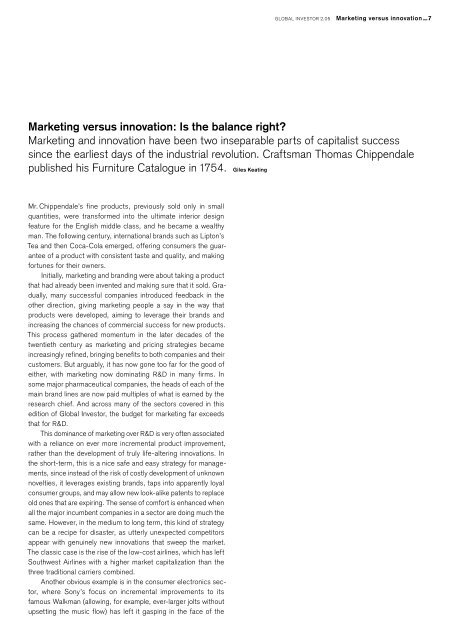Marketing and innovation
New opportunities hit global investors' radar screens Global Investor, 02/2005 Credit Suisse
New opportunities hit global investors' radar screens
Global Investor, 02/2005
Credit Suisse
You also want an ePaper? Increase the reach of your titles
YUMPU automatically turns print PDFs into web optimized ePapers that Google loves.
GLOBAL INVESTOR 2.05 <strong>Marketing</strong> versus <strong>innovation</strong>—7<br />
<strong>Marketing</strong> versus <strong>innovation</strong>: Is the balance right?<br />
<strong>Marketing</strong> <strong>and</strong> <strong>innovation</strong> have been two inseparable parts of capitalist success<br />
since the earliest days of the industrial revolution. Craftsman Thomas Chippendale<br />
published his Furniture Catalogue in 1754. Giles Keating<br />
Mr. Chippendale’s fine products, previously sold only in small<br />
quantities, were transformed into the ultimate interior design<br />
feature for the English middle class, <strong>and</strong> he became a wealthy<br />
man. The following century, international br<strong>and</strong>s such as Lipton’s<br />
Tea <strong>and</strong> then Coca-Cola emerged, offering consumers the guarantee<br />
of a product with consistent taste <strong>and</strong> quality, <strong>and</strong> making<br />
fortunes for their owners.<br />
Initially, marketing <strong>and</strong> br<strong>and</strong>ing were about taking a product<br />
that had already been invented <strong>and</strong> making sure that it sold. Gradually,<br />
many successful companies introduced feedback in the<br />
other direction, giving marketing people a say in the way that<br />
products were developed, aiming to leverage their br<strong>and</strong>s <strong>and</strong><br />
increasing the chances of commercial success for new products.<br />
This process gathered momentum in the later decades of the<br />
twentieth century as marketing <strong>and</strong> pricing strategies became<br />
increasingly refined, bringing benefits to both companies <strong>and</strong> their<br />
customers. But arguably, it has now gone too far for the good of<br />
either, with marketing now dominating R&D in many firms. In<br />
some major pharmaceutical companies, the heads of each of the<br />
main br<strong>and</strong> lines are now paid multiples of what is earned by the<br />
research chief. And across many of the sectors covered in this<br />
edition of Global Investor, the budget for marketing far exceeds<br />
that for R&D.<br />
This dominance of marketing over R&D is very often associated<br />
with a reliance on ever more incremental product improvement,<br />
rather than the development of truly life-altering <strong>innovation</strong>s. In<br />
the short-term, this is a nice safe <strong>and</strong> easy strategy for managements,<br />
since instead of the risk of costly development of unknown<br />
novelties, it leverages existing br<strong>and</strong>s, taps into apparently loyal<br />
consumer groups, <strong>and</strong> may allow new look-alike patents to replace<br />
old ones that are expiring. The sense of comfort is enhanced when<br />
all the major incumbent companies in a sector are doing much the<br />
same. However, in the medium to long term, this kind of strategy<br />
can be a recipe for disaster, as utterly unexpected competitors<br />
appear with genuinely new <strong>innovation</strong>s that sweep the market.<br />
The classic case is the rise of the low-cost airlines, which has left<br />
Southwest Airlines with a higher market capitalization than the<br />
three traditional carriers combined.<br />
Another obvious example is in the consumer electronics sector,<br />
where Sony’s focus on incremental improvements to its<br />
famous Walkman (allowing, for example, ever-larger jolts without<br />
upsetting the music flow) has left it gasping in the face of the

















